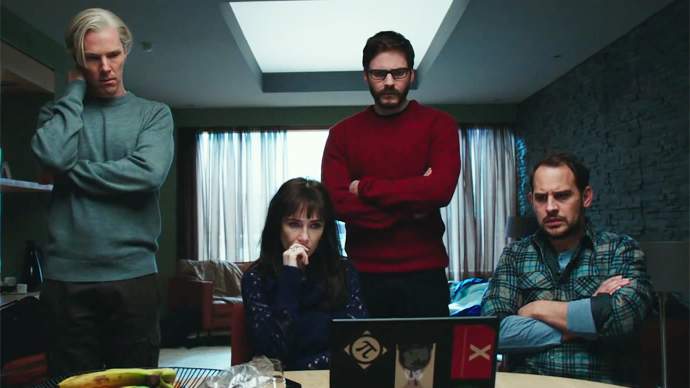The Fifth Estate
Can this much-hyped Wikileaks story match the drama of its real-life inspiration?
Overview
Julian Assange. You might have heard of him? That Lucius Malfoy-haired, Peter Garrett-choreographed, Ecuadorian Embassy-ensconced hacker who almost certainly kisses and tells. Yeah, you know him? Of course you do, because thanks to years of media coverage, Robert Connolly's impressive biopic Underground (2012), Alex Gibney's excellent documentary We Steal Secrets (2013) and, of course, Mr Assange himself, the Wikileaks/Assange saga (now largely synonymous) is one of the most well-known, well-told stories of the decade.
Accordingly, if you're going to make a new movie about that story, it had better offer up something new. Unfortunately, The Fifth Estate does not.
Directed by Bill Condon (The Twilight Saga: Breaking Dawn), The Fifth Estate sources much of its material from the two books Assange is least likely to ever recommend during cake corner, namely: Inside WikiLeaks: My Time with Julian Assange and the World's Most Dangerous Website (2011), and WikiLeaks: Inside Julian Assange's War on Secrecy (2011).
Both were written by men who were about as close to Assange as one could get in the lead up to, and during, his infamous publication of hundreds of thousands of classified US military and government documents, and both detail how their initial infatuation with this quasi-messianic figure for openness and transparency gave way to horror at his apparent total disregard for consequence. In short, powerful stuff but nothing even remotely revelatory this far into the Wikileaks narrative.
If there is a reason to see The Fifth Estate, then, it is unquestionably Benedict Cumberbatch. Few who are not Australian have ever mastered the accent, yet Cumberbatch wields both it and Assange's specific cadence and timbre with aplomb. So impressive is the feat, in fact, that it actually works against the movie. Assange's slow, measured and largely monotone articulation robs even the most dramatic moments of energy, both in real life and in this film, so much so that were it not for the consistently explosive content of his conversations, one suspects he'd be an unbearably boring man to meet in person.
Stylistically, The Fifth Estate does what it can to make coding, reading and emailing something of a spectator sport; however, the only real drama occurs when the key figures engage in actual person-to-person (cf peer-to-peer) exchanges — most notably, the debates between Assange and his right-hand man, Daniel Domscheit-Berg (Daniel Brühl), who wrote Inside Wikileaks, over what to release, and when.
Everything else feels largely pedestrian, and — remarkably — the contentious allegations of sexual misconduct for which Assange has been indicted by Sweden appear only as a footnote in the credits. Ultimately, The Fifth Estate is an example of the whole being somehow lesser than its parts; a film easily outperformed by its performers and the real life players who inspired it.





